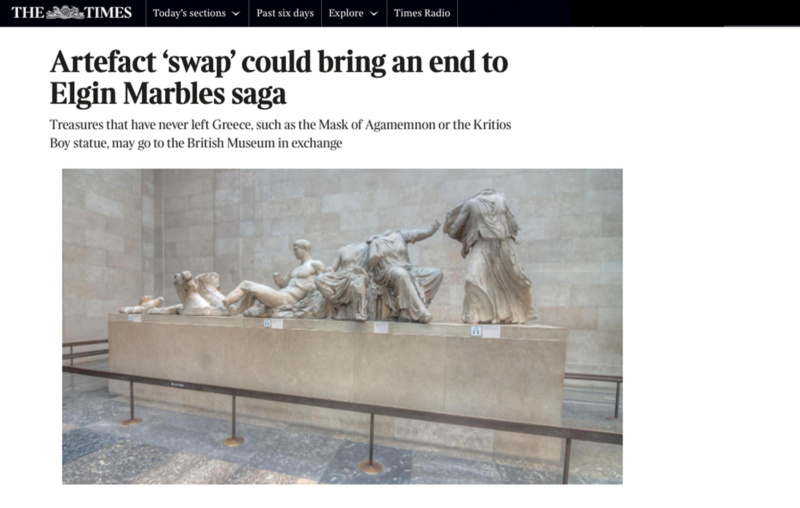The Elgin Marbles could be returned to Greece if the British Museum and the Athens government take inspiration from the Northern Ireland peace process and “agree to disagree” on who owns them, according to a campaign group.
The influential Parthenon Project thinks there should be a swap — the marbles should be returned to Athens, and precious artefacts that have never left Greece should come to Britain for temporary exhibitions.
The fate of the marbles, also known as the Parthenon Sculptures, has been the subject of one of the world’s bitterest and longest-running cultural disputes.
Best of Times Our flagship newsletter featuring our top stories and analysis, delivered every morning. Sign up with one click
The marble friezes were removed from the Parthenon from 1801 to 1812 under the orders of the 7th Earl of Elgin, who was Britain’s ambassador to the Ottoman Empire. Elgin said that he had permission of the occupying authorities in Greece to remove them, and sold them to the British government in 1816 for £35,000 (about £2.7 million today).
Ownership of more than 75 metres of Parthenon frieze, as well as 17 pedimental figures, was soon transferred to the trustees of the museum, and the pieces have been housed there ever since. They are regarded as one of the most important parts of the British Museum’s collection.
George Osborne, chairman of the British Museum, has been working on a deal with the Greek government for more than a year, but progress has been slow. One of the biggest stumbling blocks to a deal is the issue of who owns the friezes. The British Museum is not allowed, by law, to dispose of objects in its collection; Greece will not accept a loan because to do so would recognise British ownership of the marbles, which it has always rejected.
The Parthenon Project, which is backed by Stephen Fry, and two former culture ministers, Lord Vaizey and Ben Bradshaw, said it had been inspired by the Good Friday agreement, which brought the Irish Troubles to an end in 1998.
Part of the Good Friday deal says: “We acknowledge the substantial differences between our continuing, and equally legitimate, political aspirations. However, we will endeavour to strive in every practical way towards reconciliation and rapprochement within the framework of democratic and agreed arrangements.”
The Parthenon Project, which is funded by the Greek plastics magnate John Lefas, would like treasures that have never left Greece — such as the 3,600-year-old Mask of Agamemnon or the Kritios Boy statue — to come to the British Museum in exchange.
The establishment of a new “cultural partnership” would see cash raised to repurpose and refurbish the British Museum’s Duveen Gallery, where the marbles are now, and for the renovation of the National Archaeological Museum in Athens.
It is understood that the House of Cards creator Lord Dobbs, 74, who is also a member of the group, has discussed the proposed deal with Osborne. Lefas has done likewise with Kyriakos Mitsotakis, the Greek prime minister.
Osborne, 51, wrote in The Spectator last week that for the past 200 years the Marbles had been “admired by tens of millions of people and I believe they play a vital role in telling the complete story of our common humanity”.
The former chancellor also said he was attempting to broker a deal so that the sculptures could be seen in London and Athens. “We may succeed, or we may not, but it’s worth trying,” he wrote.
Osborne has held talks with Mitsotakis since he was appointed chairman in October 2021. He met the Greek leader at a five-star hotel in Knightsbridge, west London, in December, and the fate of the sculptures was the only topic on the agenda. The pair first held “exploratory talks” in November the previous at the Greek ambassador’s Mayfair residence.
Vaizey, who is chairman of the Parthenon Project’s advisory board, said the “centuries-old issue demands a fresh solution” and that the proposal is “a genuine win-win: a deliverable, forward-looking and pragmatic answer that will benefit both the UK and Greece in the short and long term”.
Fry, 65, a Hellenophile who has written bestselling books on Greek mythology, has long called for the marbles to be returned. “By ‘agreeing to disagree’ on ownership we could find a way through the logjam that has held up negotiations in the past,” Fry said. “I look forward to witnessing the joy and excitement of the Greek people when the Parthenon Sculptures are finally reunited in the Acropolis Museum in Athens, so that everyone can see this marvel in its totality as a whole piece of art.”
Italy set a precedent last May, when Palermo’s museum transferred a Parthenon marble fragment showing the foot of a goddess peeking out from the bottom of a tunic. It is technically on a four-year loan, but Sicilian authorities intend to keep extending it. The Vatican will return three Parthenon fragments on March 24.
How Can You Get Involved?
If you would like to join the efforts to reunite the Parthenon Sculptures in Greece through a cultural partnership and receive emails with campaign updates from Pagefield Communications, please subscribe below.
For press enquiries, please contact Pagefield Communications at parthenonproject@pagefield.co.

